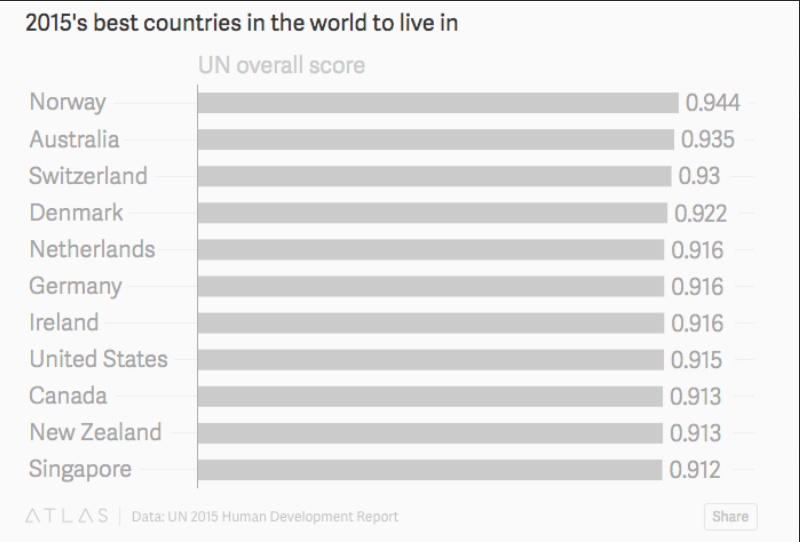Which is the best country to live in?


Get involved with our crowdsourced digital platform to deliver impact at scale
Stay up to date:
European Union
This article is published in collaboration with Quartz.
The United Nations’ annual Human Development Report, a behemoth study of every nook and cranny of the world, is out this week. And the countries that come up on top in the rankings portion of the report are entirely unsurprising.
Life expectancy at birth in Norway is 81.6 years, and the country’s gross national income per capita is $64,922.
Norway’s continuous success hinges on a number of factors, including an oil-driven economy, robust healthcare system, and strong government structure. Not just a source of pride, its natural beauty also drives a lush tourism industry.
Close runners-up on the list, released Dec. 14, include Denmark, Australia, and Switzerland. The lowest-ranking countries on the entire list were Niger, the Central African Republic, Eritrea, Chad, and Burundi. While most countries held steady in their rankings from last year, Syria fell 15 spots on the list, and Libya slid down 27 spots.
But here’s a more cheering suggestion of change, from another area of the same report: Though roughly 830 million people in the world are still classified as “working poor” (earning under $2 a day) by the UN, some two billion people were able to move out of extreme poverty over the last 25 years.
To keep up with the Agenda subscribe to our weekly newsletter.
Author: Amy X. Wang is a reporting fellow at Quartz.
Image: An Aurora Borealis (Northern Lights) is seen over a mountain camp north of the Arctic Circle, near the village of Mestervik, Norway.REUTERS/Yannis Behrakis.
Don't miss any update on this topic
Create a free account and access your personalized content collection with our latest publications and analyses.
License and Republishing
World Economic Forum articles may be republished in accordance with the Creative Commons Attribution-NonCommercial-NoDerivatives 4.0 International Public License, and in accordance with our Terms of Use.
The views expressed in this article are those of the author alone and not the World Economic Forum.
The Agenda Weekly
A weekly update of the most important issues driving the global agenda
You can unsubscribe at any time using the link in our emails. For more details, review our privacy policy.
More on European UnionSee all
Kimberley Botwright and Spencer Feingold
March 27, 2024
Simon Torkington
February 8, 2024
Mirek Dušek and Andrew Caruana Galizia
January 17, 2024








